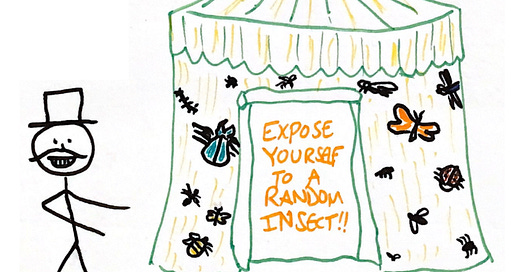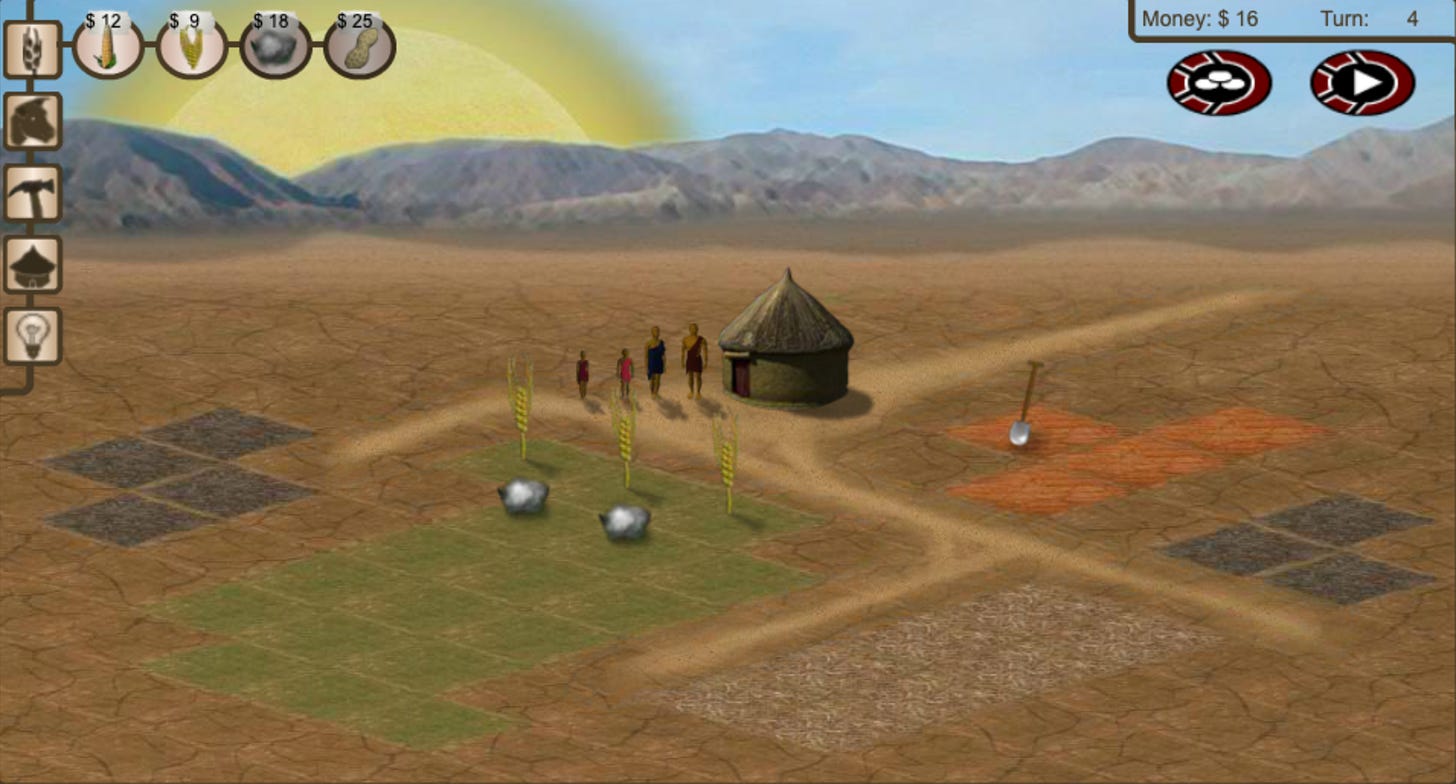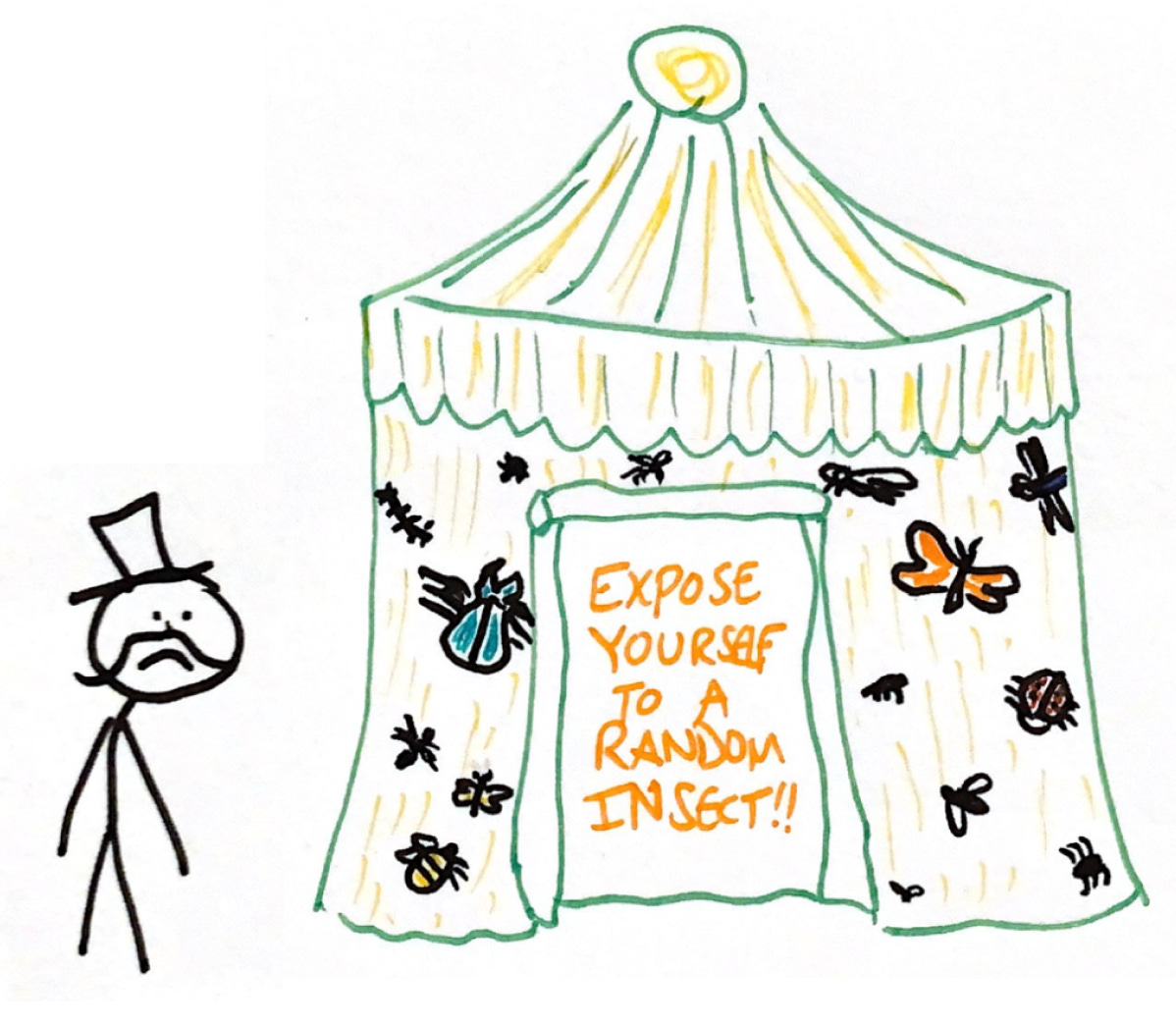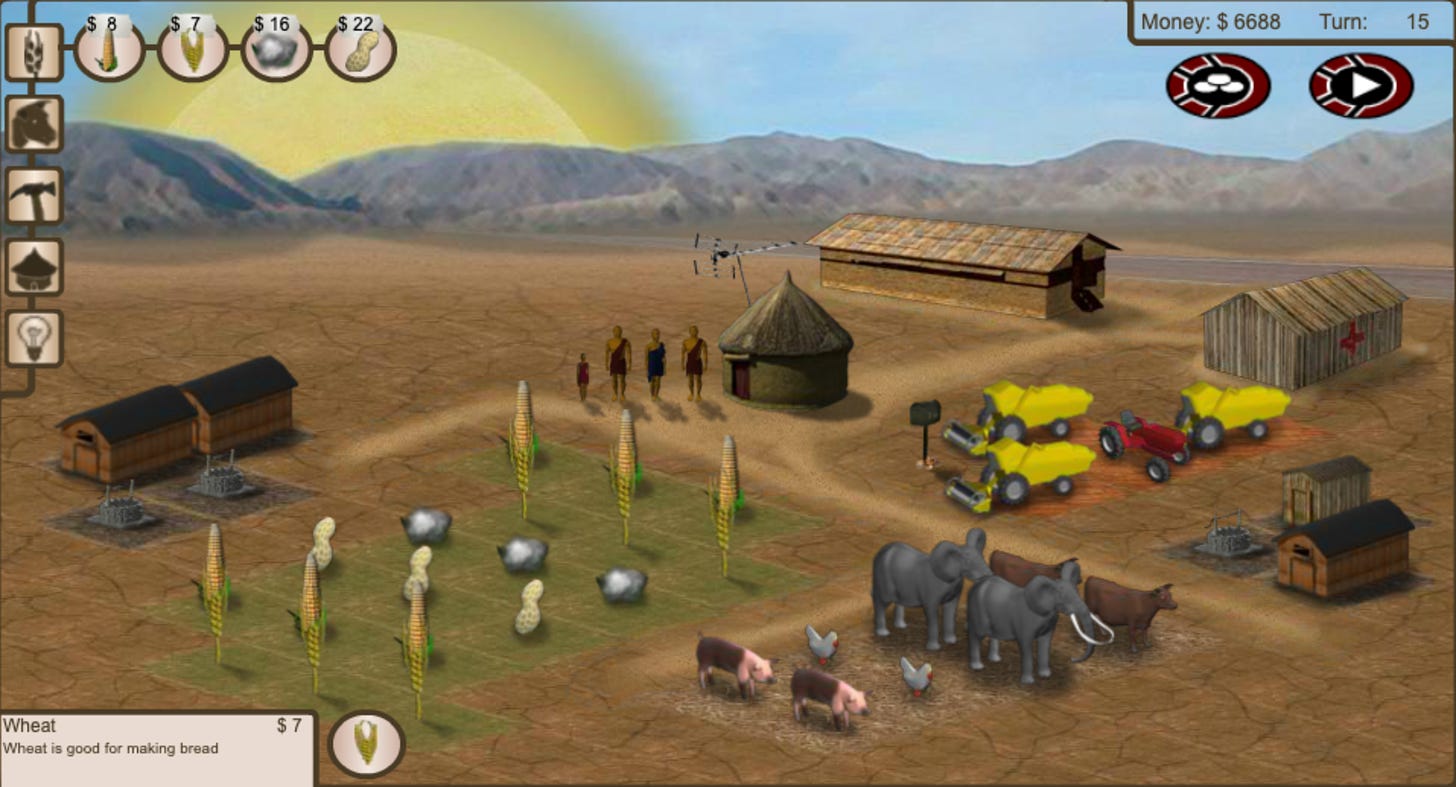The Value of Variety: Random Systems
On when you should and shouldn't expose yourself to a bunch of insects selected at random 🎲
Hi!
Issue #31 of Light Gray Matters starts with a memory from high school:
My friend was playing this simple browser game about farming in a poor African country. The game was meant to increase awareness of the poor conditions people experience in developing countries; you try to make a living from crops and livestock, but random events take their toll: harvests fail, corrupt officials take your money, companies offer to dump chemicals next to your farm, and so on.
I thought it’d be impossible to find a game from 2006 again, but no, it’s still available. It’s called 3rd World Farmer. Here’s what it looks like:
My friend said the game really showed how incredibly difficult it would be to farm in Africa: he failed at the game time and time again. “You decide to plant peanuts and, bam, the peanut harvest is bad this year, and now you have no money and your family dies,” he would say.
I tried the game myself. I won on my first try.1 Turns out I would do great as a farmer in a poor country!
I told my friend my secret: “You plant a bit of each crop, so if something bad happens to one of them, you still have the rest.“ My friend was enlightened.
For most people who are not naïve high schoolers like we were, diversification isn’t some big secret. It’s a standard practice in investing. If all your wealth is in one asset and that asset crashes, then you’re f*cked. If your wealth is spread out, then you become more resilient to random market variations: some stocks will do well, some will do poorly, and on average your portfolio will do either a little well or a little poorly. No big spikes in either direction.
One way to put it is that uniformity in investing is fragile; diversity is resilient. This generalizes: in biodiversity, an ecosystem with a single dominant species (say, a tree) is fragile to disturbances if that one species gets decimated (say, a pathogen that decimate that one tree species). An ecosystem with many types of trees will be more resilient — and perhaps even antifragile.2
In life, having a single revenue source (say, a job, or peanut crops) can put you in a bind if you lose it. Having diverse revenue streams is far better. Depending on a single person for your happiness (say, your spouse) can be dangerous to your mental health if that person leaves you or dies. It’s healthier to have a diverse array of friends and other positive relationships.
What’s interesting here is that this idea runs a bit contrary to some of the things I’ve been saying in my other variety essays. I’ve associated diversity with surprise and novelty and risk, and uniformity with comfort and predictability. But today, we see that diversity can in fact be a shield against volatility, and a bringer of stability. What’s up?
Again, it’s a question of levels to some extent. You want diversity at some levels and not at others. At the level of “your general economic situation,” you don’t want any diversity, you just want a good situation. At the lower level of the details of your economic situation, you do want diverse revenue streams, assets, etc.
It’s the law of averages, really. If something can give you a different outcome each time, and that outcome is generally (but not always) positive, then you want many different instances of that something so that the average remains positive. You want diversity in risk.
Not everything works like that, though. If the outcome isn’t positive on average, you better avoid the entire class of things. Here’s a silly example: insects. If, on average, encountering an insect brings you a disgust reaction, but the odd insect (a butterfly) brings you delight, you probably shouldn’t visit this Expose Yourself To A Random Insect!! booth that I just invented.
Sometimes, there’s too much diversity in risk, and you can get really bad outcomes that completely wipe out whatever gains you may have made. (I think these are the black swans Nassim Taleb talks about.) So, using insects again: suppose you do like insects, but the booth has a Dangerous Spider Full of Deadly Venom3 that you may randomly encounter and die as a result. Then I would advise you absolutely do not visit the booth.
Still other times, you simply do not care about minimizing volatility. Say you’re looking for your future spouse and, in order to find that person, are going on a lot of dates. (Hopefully those dates aren’t taking place at the Expose Yourself To A Random Insect!! booth.) Then the average quality of the dates doesn’t matter. All that matters is that you get one wonderful date that leads to a happy relationship.
But there are times where a system is random, and where it’s possible to get a grip on that randomness thanks to diversification. And so variety is instrumentally valuable in those cases.
(Is variety in random systems also intrinsically valuable? I guess you could say that this diverse and rich farm at the end of my 3rd World Farmer game is aesthetically pleasurable:
But that’s kind of tangential when it comes to things like finance.)
Next week, we’ll get into… politics and morality! Yay! (I’m actually really looking forward that essay. It might be most important one in the series.) Until then I remain
Yours in mastering the intricacies of peanut farming in Subsaharan Africa,
Étienne
P.S. I published an essay this week on my main blog. It’s about parentheses and footnotes! (which you may have noticed I tend to use a lot.


As, um, research for this post, I played the game a couple times today, and of course it isn’t always easy. In fact, the game is very random and depends a lot on the first few events that happen to you when you’re poor and have few options. In that sense it seems realistic enough.
Antifragility is a concept invented by Nassim Taleb to describe the opposite of fragility. An antifragile system not only resists disturbances well, but actually improves when disturbances occur. Suppose a pathogen attacks a diverse forest and reduces the population of a type of tree, resulting in a rebalancing of the system so that it becomes more ecologically productive after. Then the forest was antifragile in this situation.
Special hello to you, people who wanted to point out spiders aren’t insects. I did that on purpose. I have multiple degrees in biology, you know.









